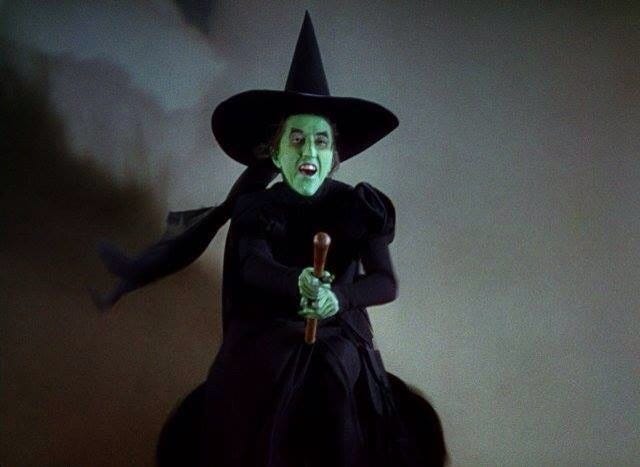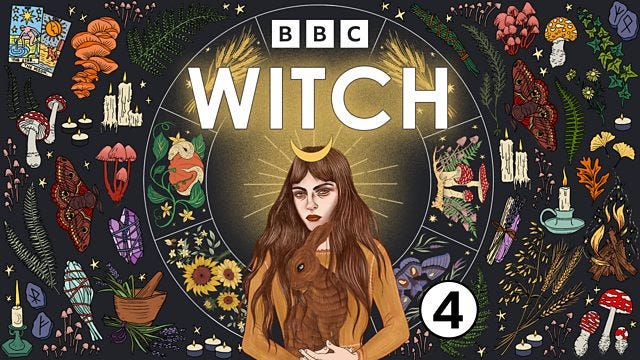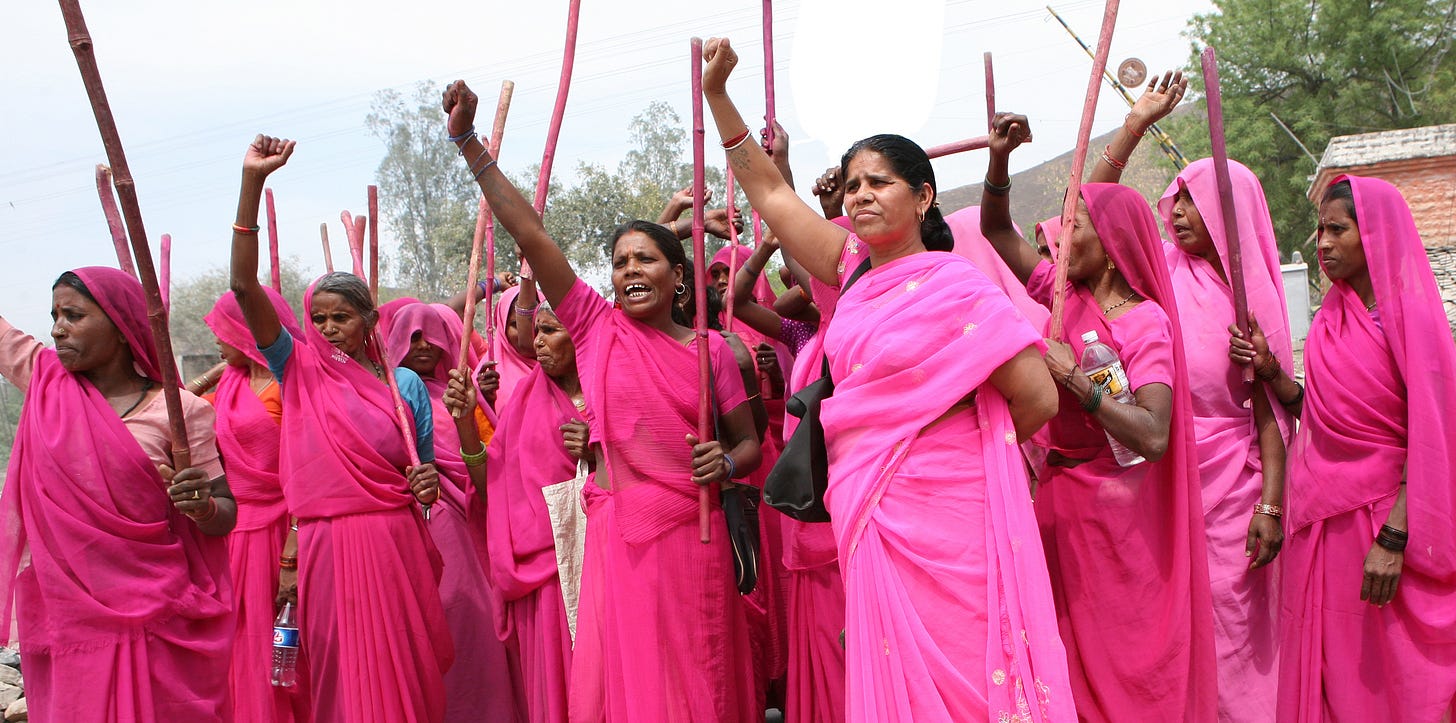I am not a witch, as far as I know, but I’m beginning to wonder if I should be.
I could buy a big pointy hat from a fancy dress store and nonchalantly walk down the street as a fashion statement - this is London after all. I could also find an old brush handle, call it a broomstick, look to the sky, and hope for the best. Maybe I could buy a large second-hand paella pan too, take it out to the garden, pour in some bubbled bath water, and call it a cauldron. I could even paint my face green, reenact the famous scene from Wizard of Oz, and screech out: “I’m Melting!! Melting!!”.
I share a tiny clip of the original here for your nostalgic fix, to get the silliness out of the way:
*
So far, so familiar, to me at least, but all of this is profoundly missing the point. Worse, it’s actually obtuse, and offensive to the intellectual dignity that is inherent in the idea of the witch, which is altogether deeper and more important, and making a kind of cultural comeback. Witch is still a pejorative term in many contexts and places, but the attempt to reappropriate it to something someone might feel they simply are, or are recognised as being, or aspire to be, or choose to be, is fascinating.
There are male witches, so there’s hope for me yet, but as a subject of social inquiry, the witch is typically about the fear of women, the terror of spells, the history of witch trials, the perceived need to control women, and it is therefore inextricably linked to the problems of patriarchy. The witch is malevolent not because she is simply evil, but because she threatens incumbent power and the ways of knowing it relies on.
(The witch…After all these years I still don’t understand capitalisation. Substack seems to think it should be The Witch, which is a curious reification, but I might use both just for fun.)
The Witch is also about magic and therefore poses an open question about ontology - what is real, and epistemology - how we know, and axiology, what is of value. A Witch is also about nature, rituals, covens, enchantment, transgressive power, and female solidarity, and it therefore has its own kind of political theory.
The witch for me symbolizes a kind of animistic anarchistic deep green transformational feminism, with a dash of bildung thrown in for good measure.
Maybe.
But how would I would I know, really? After all, I am not a witch. 😥
*
But over the summer, my Perspectiva colleague Kylen Preator recommended a podcast, which I listened to on bus rides after dropping off my children at various summer camps. I could hardly believe there was a 13-part(!) series on various aspects of witchery on the relatively conventional and trustworthy platform of BBC Radio 4, presented with extraordinary skill by India Rakusen. Rakusen was brilliant at navigating this complex terrain, and she combined a charming mixture of calming voice, diligent research, astute insight, empathetic interviewing, curiosity, fear, disclosure, skepticism, and layering of context, in which the subject matter ceased to be niche and esoteric and began to feel like it permeated everyday life.
I would encourage anyone with access to BBC Radio material (e.g. on BBC Sounds) to seek out this series and invest the eight hours or so it takes to listen to it all - it is beautifully narrated and produced, and full of edification and enchantment. For those who can’t do that, or won’t, I am afraid I can’t do this subject matter justice here, partly because this is not my job, but mostly because, again, I am not a witch. 😥.
*
Even so, here’s why I want to draw attention to this subject matter:
First, I find it fascinating that such a mainstream and respectable platform - BBC Radio 4 - considered this inquiry to be worth investing in over thirteen episodes because the series presents, shares, explores, and even venerates ways of viewing the world that are not just heterodox but esoteric and magical. That fact alone felt like a major cultural shift in what is deemed worthy of our attention by the cultural gatekeepers, who remain powerful, even in a world of YouTube and TikTok.
Second, it’s not easy to talk in any general sense about men, or women. Or men and women. Perhaps especially men and women. This difficulty stems from all sorts of reasons relating to identity politics and culture wars in the present, which relate to the brute facts of power imbalances and oppressive histories.
For instance, I believe there is something important about ‘the feminine’ (see more below) but lots of women don’t like the idea that they are implicated in that notion, and even when they do, they don’t always welcome men initiating the discussion, which can feel creatively coercive, somehow claiming the space in a way that denatures it. I might also want to highlight that biology really matters, which horrifies some and delights others, but, just as important, I am keen to point out that what biology means is not a biological matter and can and perhaps should be culturally contested on an ongoing basis. Men and women really are different, but they are different in ways that should not be exclusively defined by men, and get much more interesting when they are defined by women (I make this case here). Alas, any such exploration is usually tainted with the presumption of bad faith, and it begins with some kind of social and emotional explosion, so the conversation can rarely get beyond heat to light.
But the witch has seen it all before. As a symbol, she helps to absorb and direct some of that cultural heat, without allowing it to dissipate.
The Witch is not easy to define or categorise. She’s an idea, a figure, a myth, an archetype, and a reality with her own transgressive epistemology. She thereby serves to shift perception and understanding, or at least invites such shifts, which many believe are essential today as ways to get out of our collective stuckness, and escape our ‘solipsistic society’.
In an early episode, making a wish before blowing out birthday candles was mentioned as a social practice of magic, while in the final episode, one of the witches remarked that in her pre-witch days, she used to see a spider’s web as a thing or a place, now she saw a realm.
The Witch is not all hubble hubble toil and trouble. Sometimes what’s in play is a subtle shift in perception, a newfound openness to experience, and enchantment in the more-than-human world. I don’t know what happens in the cauldron, I am not sure hexing capitalism is the way to go, I am not sure Tarot cards can be used for predictive purposes as such, and I have all sorts of doubts more generally. But I am intrigued. I do think there is something here about, let’s say, indirect causation, the power of the mind, and ritualized intentionality that is worth taking seriously.
Third, while the terms ‘witch hunt’ and ‘witch trials’ are familiar, the extent of their horror (as far as I can tell) is rarely presented in the context of the treatment of women today. In March 2022, Scotland’s First Minister Nicola Sturgeon made a public apology to the thousands who were wrongly convicted of witchcraft:
"At a time when women were not even allowed to speak as witnesses in a courtroom, they were accused and killed because they were poor, different, vulnerable or in many cases just because they were women…It was injustice on a colossal scale, driven at least in part by misogyny in its most literal sense, hatred of women. Today on International Women's Day, as first minister on behalf of the Scottish government, I am choosing to acknowledge that egregious historic injustice and extend a formal posthumous apology to all of those accused, convicted, vilified, or executed under the Witchcraft Act of 1563."
One of the most touching lines in the BBC series is “They were just folk.”
While there are public debates about reparations for slavery and other historical injustices, I don’t remember hearing much in my formal education about the witch trials being something to learn from, or that might somehow live on today.
A few months after her public apology for historical injustice, in June 2022, Nicola Sturgeon was arrested and investigated for misuse of party funds. I don’t know the facts of the case, and beyond the presumption of innocence and admiration for her leadership, I have no settled view (but rather a bias, consciously held). What I do know is Nicola, as she is widely known, was released shortly afterward and no charges have been issued. I am not saying the arrest followed the apology, nor that the resignation was precipitated by the possibility of the arrest.
What I am saying is that it’s curious that the police felt it was necessary and appropriate to set up a large installation outside her home for several weeks, leading to speculation they were going to dig for bodies in the garden, but also thereby providing a public symbol of guilt, and a kind of social branding. The full truth has yet to emerge, but to my mind, the former First Minister was somehow witchified. Even if there was probable cause, and even if it was convenient to do forensic analysis in the front garden, and even with the due legal process being followed, in the public spectacle of the arrest, the spirit of the witch hunt endured.
Fourth, while the witch is often a solitary figure, the idea of the coven - a group or gathering of witches - is important. The BBC series gets deeply into this idea, exploring land reform near the start of the modern world and its impact on women being less able to find and support each other. Today, while the nuclear family is no longer hegemonic, it still remains a default expectation in many places, and yet there are so many other forms of bonding, mutual support, and solidarity that are neglected as a result. I believe, for instance, that a gathering of women can create emerging epistemic and emancipatory properties that are subversive and powerful.
The political side of this is evident in The Gulabi Gang in Uttar Pradesh, India, known both as a ‘vigilante’ movement and as ‘the pink sari movement’ where women get together to protect each other from domestic violence and other afflictions.
To take an even more recent example, I was listening to the BBC’s Witch podcast while the scandal in Spanish women’s football was in the news. In response to Luis Rubiales kissing Jenni Hermosso on her lips without her consent, and refusing to resign or even adequately apologise, the team closed ranks. Through their collective power, and the public support that engendered, Rubiales eventually had no option but to resign.
It might seem strange to mention this story in the context of witchcraft, but there is an underlying morphology. Hermosso’s claims were initially dismissed, and she might easily have been forgotten or gaslighted, or even outcast as a kind of witch getting in the way of the national celebration. What struck me about the story is that the solidarity of the Spanish women’s football team - a coven of sorts - drew attention to a different kind of truth, an abuse of male power. Their resolute solidarity overpowered the most powerful person in Spanish football and the cultural and institutional forces that might otherwise have been unassailable.
Behind the public and political realm, there is a whole field of feminist epistemology and embodied epistemology, and then there are psychologies of group dynamics, histories of the occult, transpersonal philosophy, and paranormal psychology. I am throwing a lot of paint at the wall here, but that’s partly because I perceive a kind of gap in our collective understanding. I have never properly explored what happens when these things come together, but I’m curious.
Might it be that the kinds of knowledge we most need today are the kinds of knowledge that arise from women getting together in person, away from the male gaze?
I don’t want to idealise that kind of gathering, nor do I want to put whatever credibility I have behind hocus pocus epistemology. Women hate each other sometimes, and they fight, they are sometimes mistaken, and they often see the world in very different ways. And women, like men, make stuff up. And there is so much wishful thinking, so much fakery, so much displacement and projection. Let’s not make another false idol.
And yet, I do believe there may be something here to explore nonetheless…
Fifth, The Witch points towards all sorts of things we need to be doing more of today, including facing our fears (e.g. The Witch as climate collapse, The Witch as AI etc), a fuller awareness of who is outcast or scapegoated today, and why; reckoning with our past, questioning orthodoxy, the re-enchantment of nature, the power of ritual, alternative ways of knowing. Reconsidering women’s ways of knowing with the inspiration of the best aspects of the witch might well give rise to new forms of epistemic and social praxis that we need today.
I am reminded of the closing remarks in Richard Tarnas’s epilogue to his classic text, The Passion of the Western Mind.
“I believe that the West's restless inner development and incessantly innovative masculine ordering of reality has been gradually leading, in an immensely long dialectical movement, toward a reconciliation with the lost feminine unity, toward a profound and many leveled marriage of the masculine and feminine, a triumphant and healing reunion…much of the conflict and confusion of our own era reflects the fact that this evolutionary drama may now be reaching its climactic stages. For our time is struggling to bring forth something fundamentally new in human history: We seem to be witnessing, suffering, the birth labor of a new reality, a new form of human existence, a "child" that would be the fruit of this great archetypal marriage, and that would bear within itself all its antecedents in a new form. I therefore would affirm those indispensable ideals expressed by the supporters of feminist, ecological, archaic, and other countercultural and multicultural perspectives. But I would also wish to affirm those who have valued and sustained the central Western tradition, for I believe that this traditionthe entire trajectory from the Greek epic poets and Hebrew prophets on, the long intellectual and spiritual struggle from Socrates and Plato and Paul and Augustine to Galileo and Descartes and Kant and Freudthat this stupendous Western project should be seen as a necessary and noble part of a great dialectic, and not simply rejected as an imperialist chauvinist plot. Not only has this tradition achieved that fundamental differentiation and autonomy of the human which alone could allow the possibility of such a larger synthesis, it has also painstakingly prepared the way for its own self transcendence. Moreover, this tradition possesses resources, left behind and cut off by its own Promethean advance, that we have scarcely begun to integrate and that, paradoxically, only the opening to the feminine will enable us to integrate. Each perspective, masculine and feminine, is here both affirmed and transcended, recognized as part of a larger whole; for each polarity requires the other for its fulfillment. And their synthesis leads to something beyond itself: It brings an unexpected opening to a larger reality that cannot be grasped before it arrives, because this new reality is itself a creative act.”
Tarnas’s grand sweep is inspiring, and the witch is not mentioned once. But as indicated above, the witch does a lot of this kind of discursive and philosophical work symbolically, and she speaks to individuals, our collective predicament, and the relationship between them. As the BBC series presenter India Rakusen put it:
“The witch really is a question, and the question is: who are you?”










Just finished to the whole BBC Witch yesterday and will definitely go onto pilgrimage in Scotland. Starting with the witches' well in Edinburgh in the next few days!
I commend you for the cautionary message in your essay: "And women, like men, make stuff up. [...] Let's not make another false idol."
There is the recent case in Australia of a man who's been vilified through the pro-active engagement of certain journalists in the mainstream media with the meToo movement. The case -- it's an allegation of rape -- went to trial in the Supreme Court of the Australian Capital Territory. The trial ended up being abandoned with no prospect of a retrial. A subsequent inquiry into the proceedings - the Sofronoff Inquiry - made some interesting findings as to what went wrong. The affair is too complex for me to unpack it here. My point is this: neither the accused nor the complainant was afforded justice under Australia's formally recognised system of law. Trial by media prevailed.
I hope that, in future, care will be exercised in embracing the covens' ways of knowing.